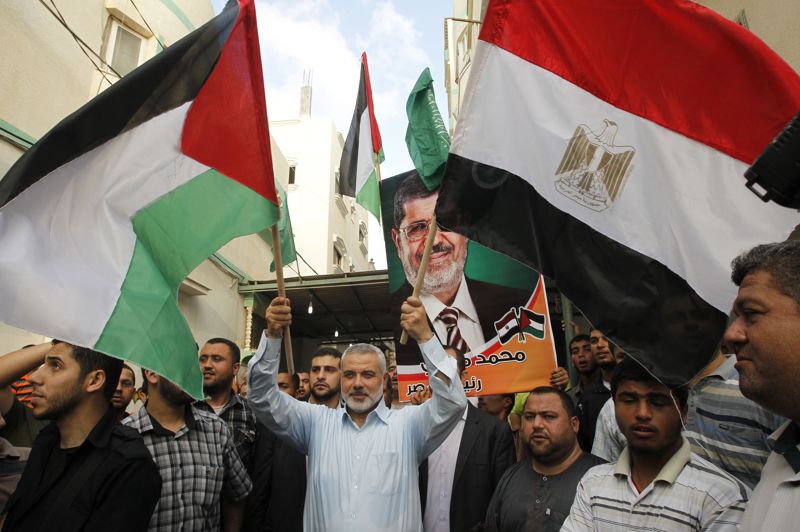CAIRO: A spokesman at the military’s Department of Morale Affairs denied in a phone call with Daily News Egypt news that riots had erupted on Monday night inside the military prison in Haikstep on the Cairo-Ismailia desert road.
The official spoke on condition of anonymity.
However, according to activist Mona Seif, coordinator of the “No to Military Trials for Civilians” campaign, hundreds of civilian prisoners tried in front of military courts rioted against bad treatment and torture, leaving dozens injured.
The campaign had received information about the riots from three different prisoners’ families.
"Since the beginning of Ramadan, inmates of the military prison have been complaining from an increasing rate of bad treatment where they are denied access to good food and of not being given the food delivered by their families," Seif told Daily News Egypt.
"They are kept in their cells for 22 hours a day, and we received many complaints singling out specific army officers who torture the prisoners," she said.
Seif said that the prisoners chanted and knocked on the walls of the prison to be heard, and that the prison wardens shot sound guns in the air to control the riot.
In a separate section of the prison, army officers, now facing a military court for joining Tahrir Square protesters on April 8, are said to have negotiated with the prison administration to stop further escalations.
"Eventually the prisoners were allowed to leave their cells. Some of them were slightly injured while two were taken to the prison hospital for medical treatment," Seif said.
Novelist Alaa Al-Aswany condemned on his twitter account Monday the conditions faced by prisoners in military prison, urging an end to military trials for civilians.
"Humiliation, beating, and torture in military prisons, did Egypt really revolt?" Al-Aswany asked.
"The only reason behind the continuation of military trials for civilians is to support oppression and the reason for torturing the detainees is to break the will of the revolutionaries and bring Egypt back to Jan. 24," he said.
Al-Nadeem Center for the Rehabilitation of Victims of Torture published the testimony of Amr Mohammed who was randomly arrested from Sadat Metro Station on Aug. 1 when military police violently dispersed a peaceful Tahrir Square sit-in.
"We arrived at the military prison after being tortured and beaten inside the armored vehicle. We were then stripped of our clothes and I was denied access to my medication. Although I requested a medical check-up, the doctor said I was fine and refused to give me my medication," Amr said.
"It was the first day of Ramadan and we were given rotten food and dirty water for iftar and denied any access to telephones to call our families. When thugs began attacking us we asked to stay in the prison mosque until we were sent to the prosecutor who released us," Amr recounted.
In a press conference held by the anti-military trials campaign Saturday, families of the detainees recounted the difficulties they face to visit their sons and deliver food to them.
"Our sons do not get the food we bring them inside the military prison. The administration either throws it away or the guards take it," said the mother of Moustafa Abdel Wahed, 17, who was arrested during the Balloon Theater clashes on June 28.
"Every time we speak to the media about the torture that our sons are subjected to inside military prison, they face even more torture, but we will never be silent," she said.
The case of 40 protesters also arrested on June 28 was adjourned to Wednesday for a final verdict over charges of attacking public servants and disturbing public peace.
Representatives of Islamist, leftist and liberal political parties in addition to presidential hopefuls Ayman Nour, Bouthaina Kamel and Hazem Salah Abo Ismail condemned in the press conference referring civilians to military trials, urging the ruling military council to retry all civilian detainees in civil courts.
"The public rejection of military trials for civilians gained huge momentum in the last couple of weeks and became a top priority in the agenda of many political powers that had previously neglected the cause," Seif said, adding that the recent prison riots came at a time when the media is more able to openly discuss the issue.
"I don’t think that the riots will cause a counter reaction. I am optimistic that what happened will support our cause to stop these trials," she added.
The campaign sent a telegraph and filed a complaint to the military council, the military prison’s administration and the prosecutor general to investigate the riots.
"Our lawyers will follow up to take the necessary legal action," Seif said.
The campaign intends to organize prisoner visits during Eid El-Fitr, especially for families who cannot afford to travel to remote prisons like El-Wadi El-Gedid and Fayoum where activists will go with them.
Meanwhile, blogger Maikel Nabil, who is currently serving a three-year prison sentence by a military court, began a hunger strike Tuesday against what he claims is discrimination against him.
Nabil criticized the amnesty given to activists Asmaa Mahfouz and Loai Nagati, compared to the treatment meted out to him.
Nabil was charged with spreading false information after writing a blog post titled ‘The People and the Army are not One Hand" citing what he calls a conspiracy by the military council against the revolution.


